
News (826)
Debating for the right cause
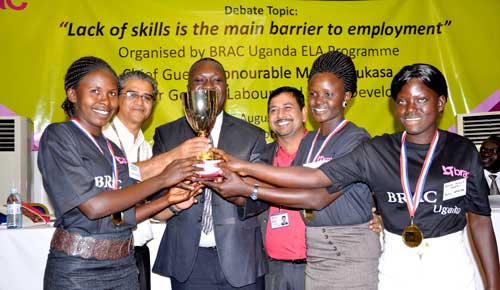
30 August, 2015
The finale of BRAC Uganda’s Empowerment and Livelihood for Adolescents (ELA) programme debate competition was held in Metropole hotel in Kampala on 25 August 2015. ELA uses debate as a technique to engage girls in critical thinking and problem solving in their communities.
At the beginning of the year, under the ELA programme, debate trainings were conducted where 8,310 girls competed within their clubs. From this, 1,385 girls went on to compete at the branch level, of which 282 proceeded to the area level. Eventually 21 girls made it to the regional level in which they were put in groups of three, each representing the seven regions in which ELA operates.
The two winning teams - Gulu region and Kampala-I region competed at the national level ELA debate tournament held at Kampala. With youth unemployment being a crucial factor affecting Uganda’s development, the topic of the debate was, ‘lack of skills is the main barrier to employment’.
Kyateka Mondo, the Assistant Commissioner for Youth in the Ministry of Gender, Labour and Social Development (MGLSD) was present at the event on behalf of Minister Muruli Mukasa. He handed over the trophies, medals and prizes to the winners – Gulu region - and the runner-up team. High officials and staff members from BRAC Uganda, officials from the MGLSD, members of BRAC Uganda Advisory Board, representatives from UNICEF, UNFPA, Barclays Bank, Standard Chartered Bank, Makerere University and other organisations were present at the event.
BRAC commits to protest violence and sexual harassment against women and girls every month
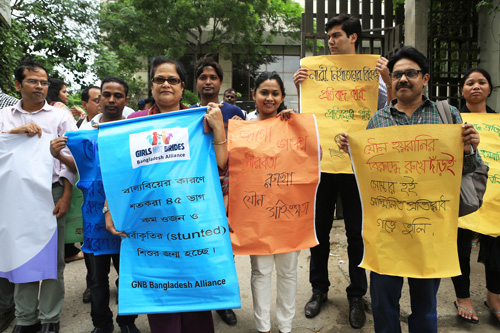
27 August 2015, Dhaka. On 14 April 2015 during the pohela boishakh celebrations around 20 women and girls were sexually abused in Dhaka University's TSC and Suhrawardy Udyan gate areas. Similar kind of incidents took place in different parts of the country on the same day, stirring the entire nation. Practices like child marriage, dowry and violence against women and girls are issues that Bangladesh continues to struggle with.
A national survey carried out by the Bangladesh Bureau of Statistics (BBS) in 2011, shows that as many as 87 per cent of married women reported having experienced both physical and psychological violence in the last 12 months.
BRAC expressed its stand against such incidents of violence and harassment and decided to organise a nationwide human chain, BRAC bondhon on every last Thursday of the month for 15 minutes starting from May 2015 until December 2015. People from other sectors and organisations, including onlookers, are also expressing solidarity by joining the BRAC bondhon. So far BRAC has organised four human chains with participation from 70,000 BRAC staff and BRAC’s affiliated community members including government officials, community leaders, parents, students, teachers in all of 64 districts, and in an average of 2,326 spots around the country.
BRAC has been working to promote women’s empowerment and gender equality since its inception. The organisation takes an active stand against harassment and sexual violence on women and children.
Bangladesh achieves the highest level of breastfeeding and the greatest increase in complementary feeding
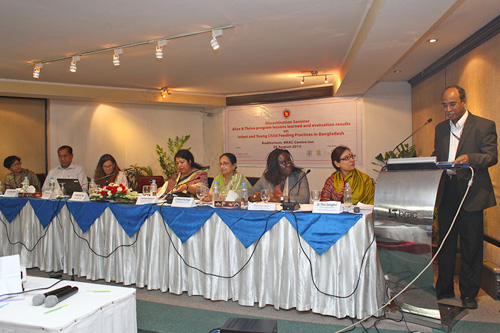
26 August 2015, Dhaka. Interpersonal contact between healthcare workers and mothers have produced a large scale improvement in infant and young child feeding programme and in hand washing habits, said speakers at a seminar yesterday.
Referring to a baseline and an endline survey conducted in 2010 and 2014 respectively in 50 sub-districts where community-based Alive & Thrive programme was implemented by BRAC, they said exclusive breastfeeding went up to 88 per cent from 48, and the percentage of mothers washing hands before feeding young children improved from 23 per cent to 31.
They were addressing a dissemination seminar on Alive & Thrive programme, lessons learned and evaluation results on infant and young children feeding practices in Bangladesh, held at BRAC Centre Inn in the capital.
The Bangladesh part of the project had been implemented by BRAC from 2009 to 2014 with a strong emphasis on community engagement by using its existing healthcare platforms and a cadre of frontline community health workers.
"People in Bangladesh are very receptive," said Shirin Sharmin Chaudhury, speaker in parliament, at the programme.
The chair of the event, BRAC’s executive director Dr Muhammad Musa noted that nutrition interventions are difficult to implement and the high success rate of Bangladesh proves the strength of BRAC’s engagement with the community.
Ellen Piwoz, senior programme officer on nutrition at the Gates Foundation’s Global Development Program, said: “We are looking forward to working in Bangladesh with government, BRAC, and all the partners in future with our new strategy.” She also added that the project on improving infant and young child feeding practices funded in three countries was the “most successful” in Bangladesh.
Launched in 2009 in Bangladesh, Vietnam and Ethiopia with funding from Bill and Melinda Gates Foundation and Canadian and Irish governments, Alive & Thrive used advocacy, interpersonal communication and community mobilisation, mass media and strategic data to improve breastfeeding and complementary feeding practices and to reduce stunting and anaemia in young children.
Besides, BRAC and other international development organisations joined the initiative under the management of FHI 360, a US-based organisation.
Dr Tina Sanghvi, country programme director and senior technical advisor, Alive & Thrive said Bangladesh's improvement in breastfeeding was better than Vietnam and Ethiopia where the exclusive breastfeeding increased from 19 percent to 58 and 72 percent to 83 respectively.
Complementary feeding with diet diversity increased in Bangladesh from 32 per cent to 64, she said.
Minimum age of marriage for girls should be 18
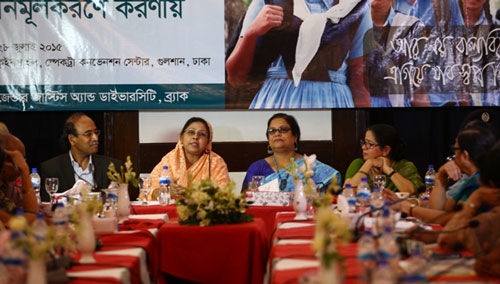
28 July 2015, Dhaka. At the seminar on ‘Way forward to stop child marriage’, experts demanded that the minimum age for marriage should be kept18 years. The seminar, organised by BRAC on 28 July 2015, was attended by government representatives, local representatives, Nikah registrars (kazis), religious leaders (Imams), and representatives from human rights organisations, non-government organisations and media.
Sheepa Hafiza, director of BRAC’s gender justice and diversity and migration programmes, presented the keynote paper. The major findings of the keynote paper included opinions and recommendations collected from the workshops held in 19 sub-districts of Bangladesh. A total of 1,294 people participated in these sub-district workshops, including representatives from local government, civil society, NGOs, and religious leaders.
State minister for Ministry of Women and Children Affairs (MoWCA), Meher Afroz Chumki said, “There is no scope for confusion on the minimum age for marriage. It remains 18. Our government is a women-friendly government and will not take any step that will affect women’s overall welfare.”
During the open discussion the religious leaders, local government representatives and speakers suggested using voter ID or birth certificate to confirm the age of girls and boys; stop illegal appointments of sub-kazis, and holding regular discussions to raise awareness on this issue during various social and religious gatherings.
Present as a special guest, Dr Rasheda K Chowdhury, executive director of CAMPE said, “We have to strengthen the birth registration offices, so that no one can change the original birth date.” She added, “Girl child drop out from school is one of the major reasons for child marriage. It has been observed that a major drop outs happen when stipends are stopped due to less than 80 per cent attendance for girls. Sanitation is a major factor here influencing girls’ attendance. So the government needs to ensure sanitation at schools as well.”
The seminar was chaired by BRAC’s executive director, Dr Muhammad Musa. In his concluding speech he said, “Along with enforcing the law, we have to create a social movement to prevent child marriage. We need to bring a change in our patriarchy-based social psyche”.
Present as guests were chairperson of Jatiyo Mahila Parishad, Ayesha Khanam, former chairperson of Women and Gender Studies Department of Dhaka University, Professor Nazma Chowdhury, DIG of Police, Mili Biswas, country representative of DFID Sarah Cook, and Farzana Rupa from Channel 71.
Sir Fazle Hasan Abed receives World Food Prize
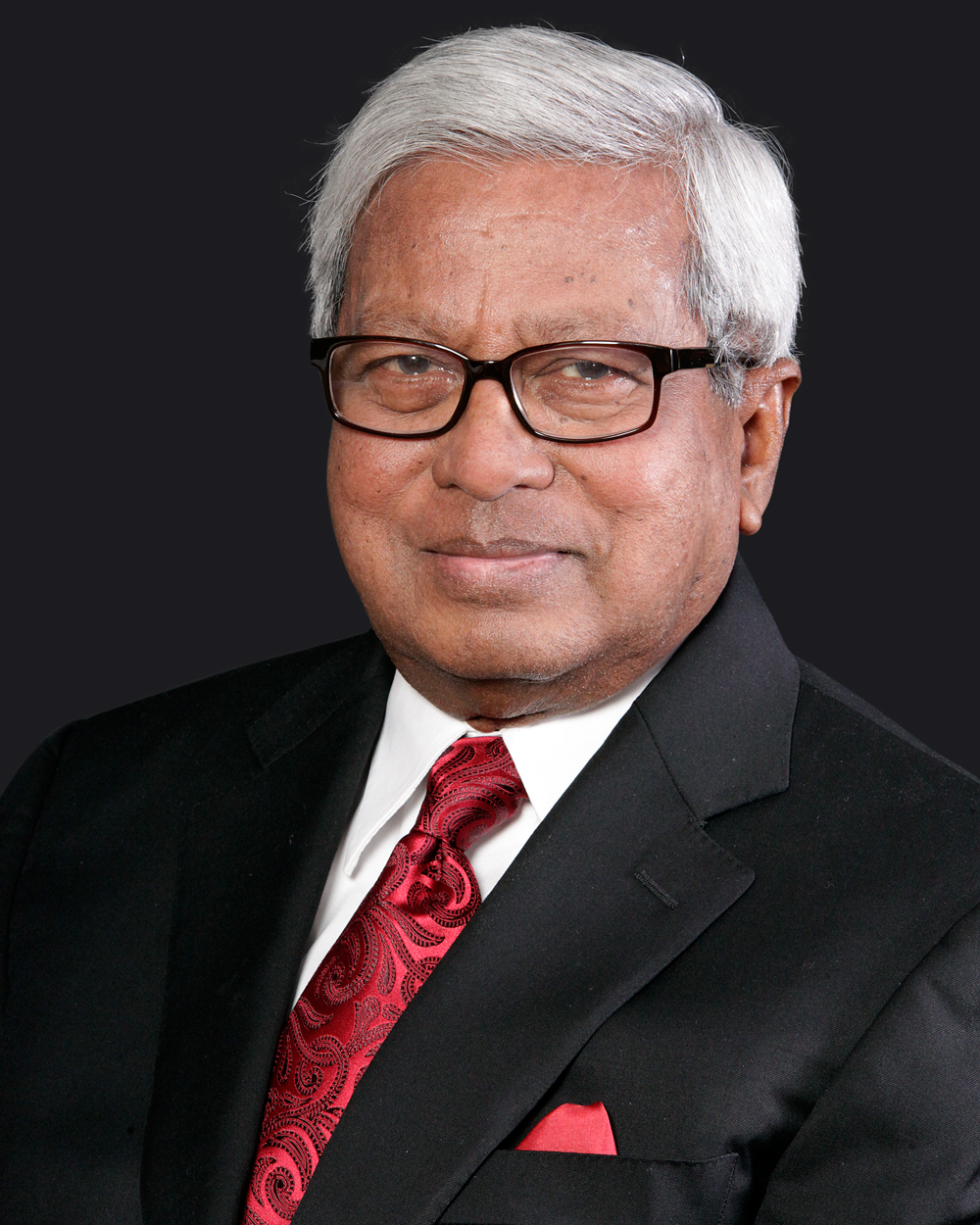 Sir Fazle Hasan Abed, BRAC’s founder and chairperson, was announced as the winner of the 41st annual World Food Prize on 1 July 2015. Sir Fazle has been recognised for his outstanding contribution to enhancing the world's production and distribution of food to those most in need.
Sir Fazle Hasan Abed, BRAC’s founder and chairperson, was announced as the winner of the 41st annual World Food Prize on 1 July 2015. Sir Fazle has been recognised for his outstanding contribution to enhancing the world's production and distribution of food to those most in need.
Ambassador Kenneth M. Quinn, President of the World Food Prize Foundation, announced this year’s winner at a ceremony at the State Department in Washington, DC. The Prize, which includes an award of USD 250,000, has been referred to as the Nobel prize for food and agriculture.
“Being selected to receive the 2015 World Food Prize is a great honour,” said Sir Fazle in a statement. “I thank the Foundation for its recognition of the work of BRAC, which I have had the privilege to lead over the last 43 years.”
“The real heroes in our story are the poor themselves and, in particular, women struggling with poverty. In situations of extreme poverty, it is usually the women in the family who have to make do with scarce resources. When we saw this at BRAC, we realised that women needed to be the agents of change in our development effort.”
Announcing Sir Fazle’s name as the Laureate, Ambassador Kenneth Quinn said, “At a time when the world confronts the great challenge of feeding over nine billion people, Sir Fazle Abed and BRAC, the organisation he founded and leads, have created the preeminent model being followed around the globe on how to educate girls, empower women and lift whole generations out of poverty. For this monumental achievement, Sir Fazle truly deserves recognition as the 2015 World Food Prize Laureate.”
At the ceremony, the U.S. Agriculture Secretary Tom Vilsack said, “I offer my sincerest congratulations to Sir Fazle and appreciation for the progress he has made in improving people’s lives, alleviating hunger, and providing pathways out of poverty. Sir Fazle’s and his organisation’s recognition that engaging women in STEAM fields—science, technology, engineering, agriculture, and math—benefits our local and global communities is a vision that we share at United States Department of Agriculture. It is my honor to participate in this event today with people who see the need for innovative approaches to feeding our rapidly growing population”.
BRAC is widely credited as a major contributor to Bangladesh's achievement in halving poverty and hunger* levels since 1990, in line with the UN's Millennium Development Goals, through its sustained efforts in the fields of poverty and hunger eradication and food security. By focusing on scalable solutions, BRAC’s food programmes have turned into sustainable social enterprises that provide inputs and access to stable markets for the rural poor.
BRAC's agriculture and food security programmes are part of a larger set of poverty eradication interventions working in 11 countries, empowering the poor, especially women and girls, using tools such as microfinance, education, health care, legal services, community empowerment, social enterprises, and a full-fledged university, BRAC University, in Dhaka.
Download the 2015 Laureate Announcement
BRAC makes significant contributions to reach Millennium Development Goals
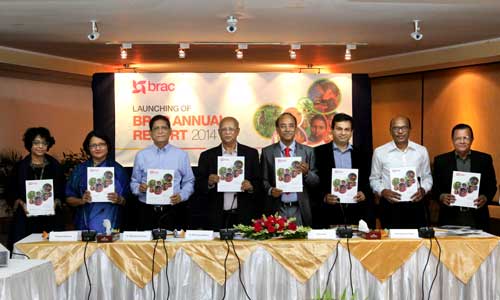
BRAC has made significant contributions in attaining Millennium Development Goal (MDG) that have been set to achieve by 2015-said speakers at BRAC’s annual report 2014 launch. The event was held on 23 June 2015 at BRAC centre at Mohakhali.
Bangladesh is on track in achieving the 5 of the 8 MDGs. The country has made remarkable progress in the areas of poverty alleviation, primary school enrolment, gender parity in primary education, lowering the infant and under-five mortality rate and maternal mortality ratio.
Highlighting BRAC’s achievements executive director Dr Muhammad Musa said, “99.97 per cent out of 43,843 BRAC primary school students passed the PSC exam in 2014. Around 61.17 per cent of these students are girls and their pass rate is 99.9 per cent.
In health sector, BRAC has achieved 91 per cent immunisation coverage in its working areas across 64 districts. The TB treatment success rate is 95 per cent.
Dr Musa also stressed that significant improvements have been made in alleviating ultra poverty. Since 2002 BRAC’s ultra poor programme covered 1.6 million people and 95 per cent of this population have been able to come out of ultra poverty. In addition to that BRAC’s water sanitation and hygiene (WASH) programme has distributed 32 million sanitary latrines in 250 sub districts.
Explaining BRAC’s future direction Dr Musa added, “BRAC is extending its services to manage urban challenges, youth skills development, climate change resilience and violence against women”
BRAC and BRAC International’s senior director Asif Saleh moderated the event. Country Head of Department for International Development (DFID) Sara Cooke, Counsellor (Development Cooperation), Department of Foreign Affairs and Trade (DFAT) Priya Powell and BRAC senior management and representatives from media also attended the event.
At the closing session, BRAC launched its new ‘augmented reality’ app to complement the content of its annual report. Smart phone users can access additional features using this app. This is the first app of its kind in Bangladesh which is also developed by BRAC staff.
Dr Muhammad Musa appointed as the new executive director of BRAC
.jpg) Dr Muhammad Musa has been appointed as the new executive director of BRAC, the largest development organisation in the world.
Dr Muhammad Musa has been appointed as the new executive director of BRAC, the largest development organisation in the world.
Dr Musa is a veteran development practitioner whose career spanned in different parts of the world in Asia, Africa and North America over a period of 32 years. Immediately prior to joining BRAC, he was the CEO of CARE India and represented the country at the global board of CARE International.
Dr Musa has a masters in public health (MPH) from Johns Hopkins University, USA, post graduate diploma from The Netherlands Universities Foundation for International Development, and an MBBS from Chittagong Medical College, Bangladesh.
The agriculture-nutrition linkage is crucial

Researchers, policymakers and implementers collectively stressed on the importance of agriculture in improving nutrition at the “Leveraging agriculture for nutrition in Bangladesh” research dissemination seminar held at BRAC Centre INN today. This knowledge sharing event was organised by BRAC as the Bangladesh partner of the Leveraging Agriculture for Nutrition in South Asia (LANSA), which is an international research consortium funded by the UK government’s Department for International Development (DFID).
Chief guest of the workshop Dr Shelina Afroza, secretary of Ministry of Livestock and Fisheries said ‘This seminar has lessened the gap between researchers and policy makers’ and encouraged the researchers to reach out to policy makers and relevant ministries with their findings and data.
In his keynote presentation, Dr Mahabub Hossain mentioned “GDP growth has increased from 3.5% per year during 1971-89 to 5% in the 1990s and further to 6.2% during last decade”. He also emphasised that diversified agricultural production along with some socio-economic factors including women’s empowerment have a key role in improving nutrition in households. Knowledge generated through research should be translated into actions through proper policy implementation. This event was one step towards that.
Women empowerment plays a key role in improving dietary quality, mentioned IFPRI’s chief of party, Dr Akhter Ahmed in his presentation. He also identified the skewed rate of rice consumption in our country ‘for the poor population, 78% of calorie comes from rice, 57% of protein comes from rice’. IFPRI research found out that, Behavioural Change Communication is critical in enhancing nutrition in Bangladesh.
Representatives from Ministry of Health, FAO, GAIN, IFPRI, World Fish, Concern Worlwide, FHI 360, HKI, Dhaka University, University of Liberal Arts, Harvest Plus, Aftab Bahumukhi Farm Ltd, SUN among others were present at the event.
Establishment of an independent land commission recommended
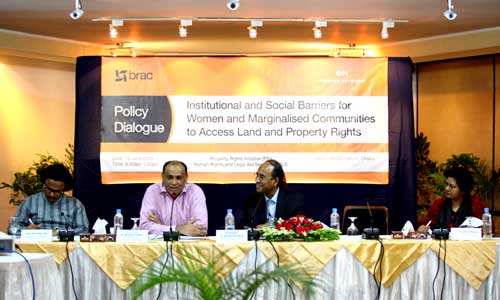
Speakers urged the government to set up an independent land commission to ensure improved services for citizens, especially for women and minorities, at a policy dialogue organised by BRAC. The policy dialogue titled, ‘Institutional and social barriers for women and marginalised communities to access land and property rights’ took place on 15 June 2015, at BRAC Centre. The event was moderated by BRAC’s executive director, Dr Muhammad Musa.
“An umbrella land services authority needs to be established in each upazila with a view to offer one stop service,” said additional secretary and former director general of land records, Md Abdul Mannan, in his presentation. He made this recommendation to overcome the obstacles in realising property rights of women and marginalised people.
Special guest of the event, honourable state minister, Ministry of Land, Mr Saifuzzaman Chowdhury urged all stakeholders “to come up with a proposal to address resolving this land rights issue’.
BRAC organised this policy dialogue as part of its property rights initiative (PRI) project. PRI aims to develop linkages between laws and rights by helping poor communities in identifying their entitlement to property rights and supporting them in accessing their claims.
Present at the dialogue as a panellist, Barrister Sara Hossain advised, “We should exercise the intervening opportunities present in our existing laws instead of solely aiming for formation of a new law. For example, there is a scope of gifting property to women in Muslim law. This can be used to deal with property rights issues.” This dialogue was a step to create a coordination amongst the organisations working from grassroots to policy level on land rights issues.
Leading researchers, land rights and women’s rights activists, academicians, and representatives of NGOs and CSOs including international development partners attended the event. They reiterated the necessity to simplify and shorten the otherwise complex land documents like khatian, dalil and porcha for easier understanding.
The director of BRAC’s human rights and legal aid programme, Dr Faustina Pereira concluded the dialogue with a commitment to come up with an activity mapping. Organisations working in the land rights issue will identify their working areas in the map to ensure a more coordinated approach to work in future.
BRAC announces USD 1.5 million contribution to Nepal

BRAC, the international NGO based in Bangladesh, announces contribution of USD 1 million from its fund to Nepal earthquake victims. In addition to this, BRAC Bangladesh, BRAC Bank and BRAC University staff will contribute their one-day basic salary, which is USD 300,000 in total. BRAC Social Enterprises will also contribute another USD 200,000, totalling BRAC’s contribution to Nepal to USD 1.5 million. Moreover, BRAC already took initiative to mobilise USD 15 million from international donors. BRAC International and BRAC’s affiliates in UK and USA will raise these additional funds.
BRAC will start its support activities in one of the most affected areas of Nepal, Nuwakot. Explaining the initiative, senior director of strategy, communications and empowerment of BRAC and BRAC International, Asif Saleh said, “From the very beginning, BRAC has been dedicated to improving the lives of people. We believe it is BRAC’s mandate to come in and aid our neighbouring country, as it faces a major humanitarian crisis. BRAC has years of experience in emergency disaster response. We successfully carried out operations in Haiti, after the devastating earthquake in 2010, Sri Lanka, and in Indonesia after the deadly tsunami in 2004”.
The two yearlong support programme in Nuwakot includes household support for 2,000 household, rehabilitation of 200 maimed earthquake victims (both short-term and long-term), psychosocial rehabilitation of 30,000 earthquake victims, and livelihood support for 5,000 households.
BRAC International already contributed USD 50,000 from its fund to the earthquake-stricken nation. An emergency medical team from BRAC has been sent to Nepal to provide medical treatment, essential medicine and dry food to earthquake victims. This team is working in Dolekha, Bhaktapur, Sindupalchawk, Lalitpur, and Kathmandu in collaboration with the Nepalese government.
Join the world’s biggest family




